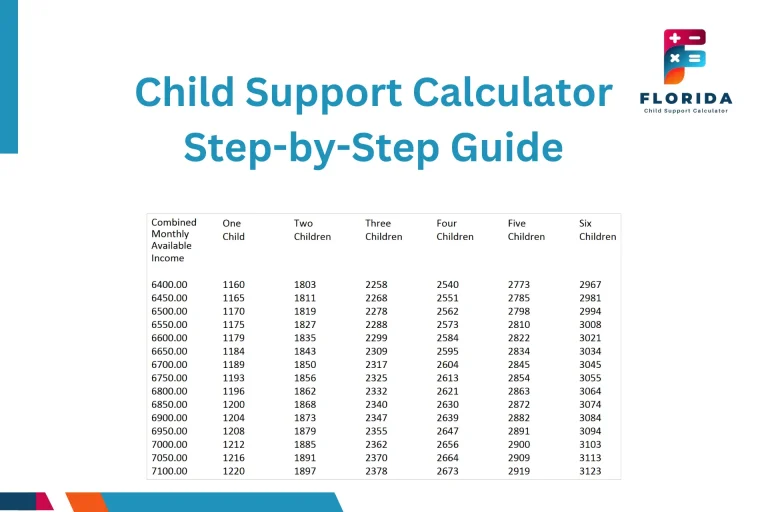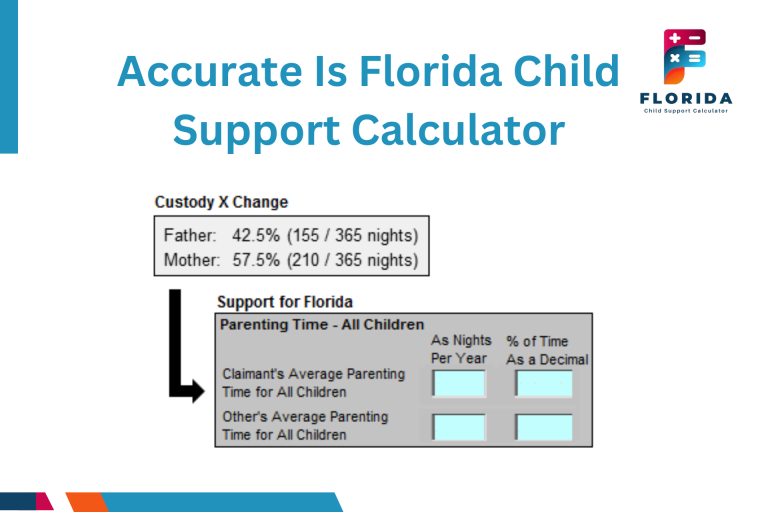Do Both Parents Have to Work for Child Support in Florida?
Do both parents have to work for child support in Florida? That’s a big question for moms, dads, and families going through a split. If you’re worried about whether you need a job or if your ex needs one, this guide will help.
Florida doesn’t always need both parents to work, but the court still makes sure both help support the child. Even if a parent isn’t working, the court might count how much they could earn.
Sounds confusing? Don’t worry. We’ll explain everything in simple words, with examples and real stories, so you know exactly what to expect. Let’s break it down, one easy step at a time.

How Is Child Support Calculated in Florida?
Let’s start with the basics. Florida uses something called the Income Shares Model. That means the court looks at how much money both parents make. Then it decides how much each should pay based on that income. Here’s a simple example:
- You make $3,000/month.
- Your ex makes $1,000/month.
- Together, you both make $4,000.
You earn 75% of the total, so you’d pay 75% of the support amount. But wait, it’s not just about money. The court also looks at:
- Who takes care of the child more (overnights matter)
- Childcare and medical costs
- Any special needs
If you’re both working and sharing time equally, support might be low. But if one of you has more money or more time with the child, that changes things.
Does Florida Law Require Both Parents to Work?
Nope. Florida doesn’t have a rule that says both parents must work. But here’s the twist: the court still expects both parents to contribute.
Let’s say you’re healthy, your kid’s in school all day, and you’re not working. The judge might say, “Well, you could be working.” Then they’ll assign you something called imputed income (more on that later). It’s like giving you a pretend paycheck based on what you should earn.
So even if you’re not working, you can still owe support. That surprises a lot of people!
Bottom line: No, the law doesn’t make you get a job. But yes, the court might act like you have one anyway.
What Happens If One Parent Doesn’t Work?
So, what if you, or your ex, just isn’t working? Maybe they’re staying home, or maybe they quit their job. That’s where Florida courts start asking questions. Here’s what they look at:
- Are you healthy?
- Can you get a job?
- Are you caring for a baby or a child with special needs?
If you say, “I stay home with the kids,” but those kids are in school 8 hours a day, the court might say, “Time to go back to work.”
Now let’s flip it. If you truly can’t work because of health issues or disability, and have proof, the court can give you a break.
Example: One mom on Reddit said the judge gave her “fake income” because she didn’t want to work. But another parent with medical records got a pass.
So yeah, the court checks the facts, not just the excuses.
What Is Imputed Income in Florida?
Alright, let’s talk about imputed income. Sounds fancy, right? But it’s really just pretend money, the court says you should be making, even if you’re not working right now.
Let’s say you’re not earning anything. The judge might still say, “You could be making $2,000 a month.” Boom. Now the court acts like you are making that money. That’s your imputed income. How do they decide the amount? They look at:
- Your last job
- Your education
- What jobs are open around you
- Minimum wage (which is $13/hour in Florida)
So if you’re healthy, have experience, and just choose not to work? You’re still on the hook. It’s like getting graded for a class you skipped.
Can You Avoid Paying Child Support by Not Working?
Nope. Nice try, though. Florida courts see right through this trick. If you quit your job to dodge support, the judge might say, “Sorry, we’re still counting your income.” And if you refuse to pay? That’s a whole other level. Here’s what the state can do if you don’t pay:
- Take your paycheck (called wage garnishment)
- Freeze your bank account
- Take your tax refund
- Suspend your license
Even send you to jail
And guess what? Saying “I’m broke” without proof won’t help. Florida’s courts are smart. They’ll check your bank records, 1099s, even apps like Venmo and CashApp.
So, no, you can’t just sit out and expect to skip support.
Can a Stay-at-Home Parent Still Get Child Support?
Yes! If you’re the one caring for the child most of the time, you can still receive child support, even if you don’t work. But there’s a catch…The court wants to know:
- Why are you staying home?
- Is your child very young or has special needs?
- Could you be working part-time while the kid’s at school?
If your answers make sense, the judge might say, “Cool, you deserve support.” But if the child is 10 and in school 8 hours a day, the judge might say, “Time to get a job.”
Real talk: One mom on YouTube said the court gave her imputed income because her child was in middle school. The judge said, “You’ve got time to work now.”
So yes, stay-at-home parents can get support, but only if it makes sense to the court.
How to Modify Child Support if You Lose Your Job
Lost your job? First, breathe. It happens. But now comes the important part: You need to tell the court.
Florida doesn’t let you just stop paying. If you lose income, you have to file for a child support modification right away. Until the court approves it, you still owe the old amount, no matter what. Here’s what to do:
- File a petition to modify support
- Show proof (termination letter, unemployment status, medical paperwork)
- Keep making payments if you can, even small ones
Warning: A dad on Reddit said he lost his job and didn’t tell the court. Six months later, he owed over $10,000 in back child support. Ouch.
So don’t wait. The sooner you file, the better your chances of getting help.
Do New Spouses’ Incomes Affect Child Support in Florida?
This one’s a hot topic. The short answer? No. Your new husband or wife’s money doesn’t count when the court figures out child support.
Florida only looks at the biological or adoptive parents’ incomes.
But there’s a twist. If you get married and suddenly quit your job, hoping your new spouse will cover everything, the court might raise an eyebrow. They could say, “Hey, you used to make $3,000 a month, we’re still counting that.”
So even if you’re now living large with a rich new spouse, you’re still responsible for your part.
Example: A mom on Quora said her ex stopped working after remarrying. The court still imputed his old income and made him pay.
Can the Court Force You to Get a Job?
No one’s going to drag you into an office and hand you a name tag. But Florida courts have their own way of “nudging” you to work. They do it by imputing income. Here’s how it works:
- The judge checks your skills, job history, and education
- If you’re healthy and capable, they’ll assign you a pretend salary
- They may even bring in a vocational expert to say how much you should be earning
So no, they won’t force you to clock in. But they’ll treat you like you are, and that means child support payments are still coming.
Real case: One dad in Tampa refused to take jobs he felt were “beneath him.” The judge imputed income based on his past salary, $60K/year. That set his support at over $1,000/month.
Real Stories from Florida Parents (Reddit, YouTube, Quora)
Let’s get real. The internet is full of Florida parents sharing what really happened in court. And guess what? A lot of people are surprised by how tough the system is.
Story 1, From Reddit:
One dad shared that his ex hadn’t worked in five years. She claimed she was a stay-at-home mom. But their kid was 9 and in school all day. The judge imposed a $2,000/month penalty anyway. He said, “She could work. So she should help.”

Story 2, From YouTube:
A mom said she was a full-time caregiver. But the court still counted part-time income because her teen didn’t need constant care. The judge told her, “We expect some contribution.”

Story 3, From Quora:
A person asked if cash jobs “don’t count.” A lawyer replied: “They absolutely do. Florida will ask for your bank statements, Venmo records, and even social media if needed.”
Moral of the story? Courts look for effort, not excuses.

FAQs About Child Support and Working in Florida
Q: What if I’m working part-time?
That might not be enough. If the court believes you could work more, they’ll still impute income based on full-time work.
Q: Do freelance jobs or gig apps count?
Yes! Uber, DoorDash, Etsy, even Twitch, if money’s coming in, it counts.
Q: I’m in school, do I still have to pay?
If you’re in college or trade school, the judge will look at your schedule. You might get some wiggle room, but not always.
Q: What if I’m too sick to work?
You’ll need medical records, doctor notes, or disability benefits to prove it. The court won’t just take your word.
Q: My ex refuses to work. What can I do?
You can ask the court to impute income to them. Bring proof of job openings, past work, or educational history.
Final Thoughts: What Florida Parents Need to Know
Here’s the bottom line: Florida doesn’t need both parents to work, but it does expect both to pitch in financially.
Even if you don’t have a job, the court may pretend you do. That’s how they keep things fair for the child. And if you’re thinking of dodging the system by quitting or hiding income, think again. The court has tools, and real-life stories show they use them.
So, whether you’re a stay-at-home parent, between jobs, or figuring things out, always be honest. Document everything. And if you’re not sure what to do next, talk to a Florida family law attorney.
Kids come first, and the court makes sure of that.






